A Comprehensive Report on Management and Operation: Unilever Example
VerifiedAdded on 2020/10/22
|14
|4850
|257
Report
AI Summary
This report provides a comprehensive analysis of management and operation, using Unilever as a primary case study. It begins by comparing and contrasting the roles and characteristics of leaders and managers, highlighting their distinct functions within an organization. The report then delves into the practical application of leadership and management principles, examining how these roles contribute to business success. It explores various leadership theories, with a specific focus on Adair's leadership model, and discusses the importance and value of operational management in achieving business objectives. Furthermore, the report examines external factors that influence business operations and decision-making processes. Through this analysis, the report offers valuable insights into effective management strategies and the critical roles of leaders and managers in driving organizational growth and efficiency. The report also covers various topics such as difference between role of a leader and the function of a manager, number of theories and approaches, importance and value of operation management in order to achieve business objectives.
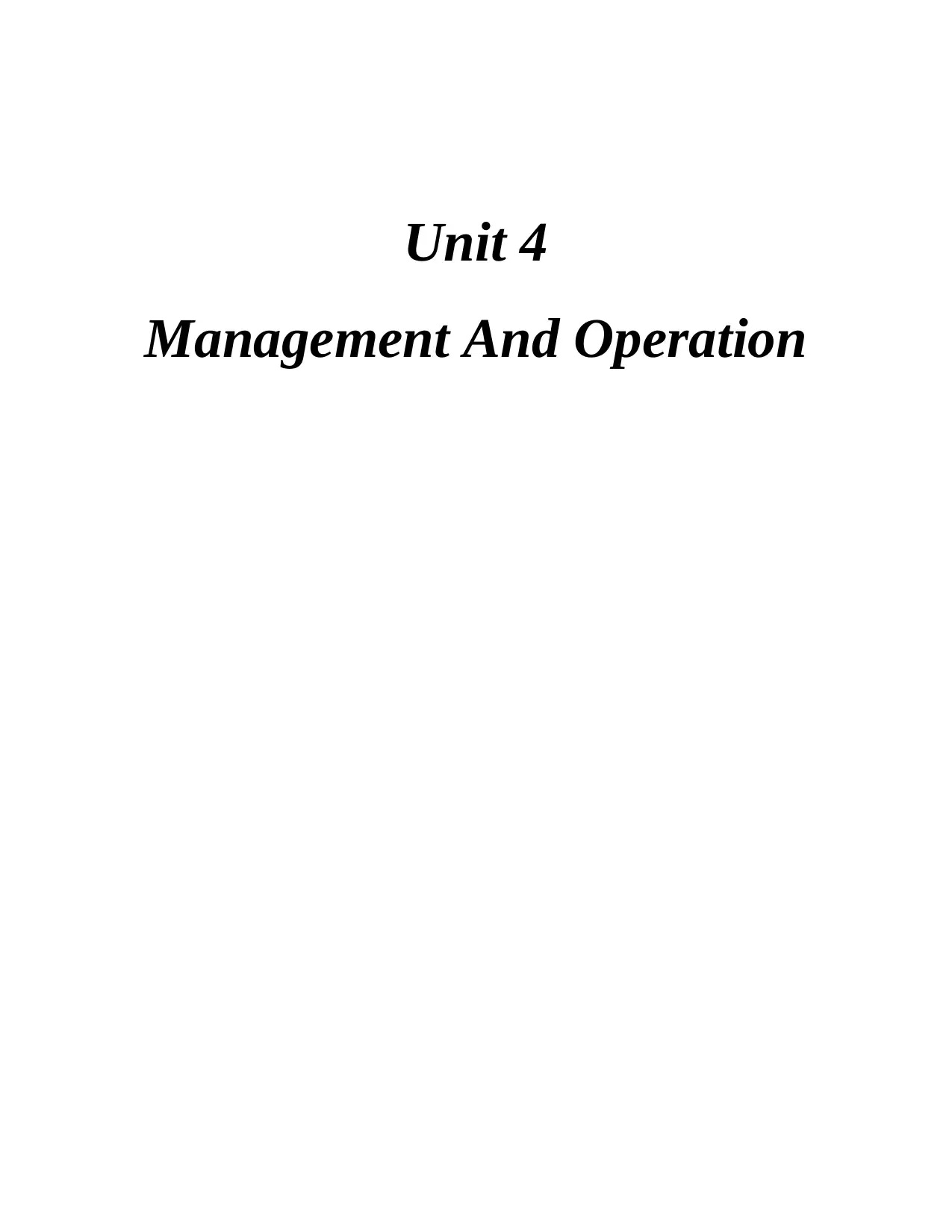
Unit 4
Management And Operation
Management And Operation
Paraphrase This Document
Need a fresh take? Get an instant paraphrase of this document with our AI Paraphraser
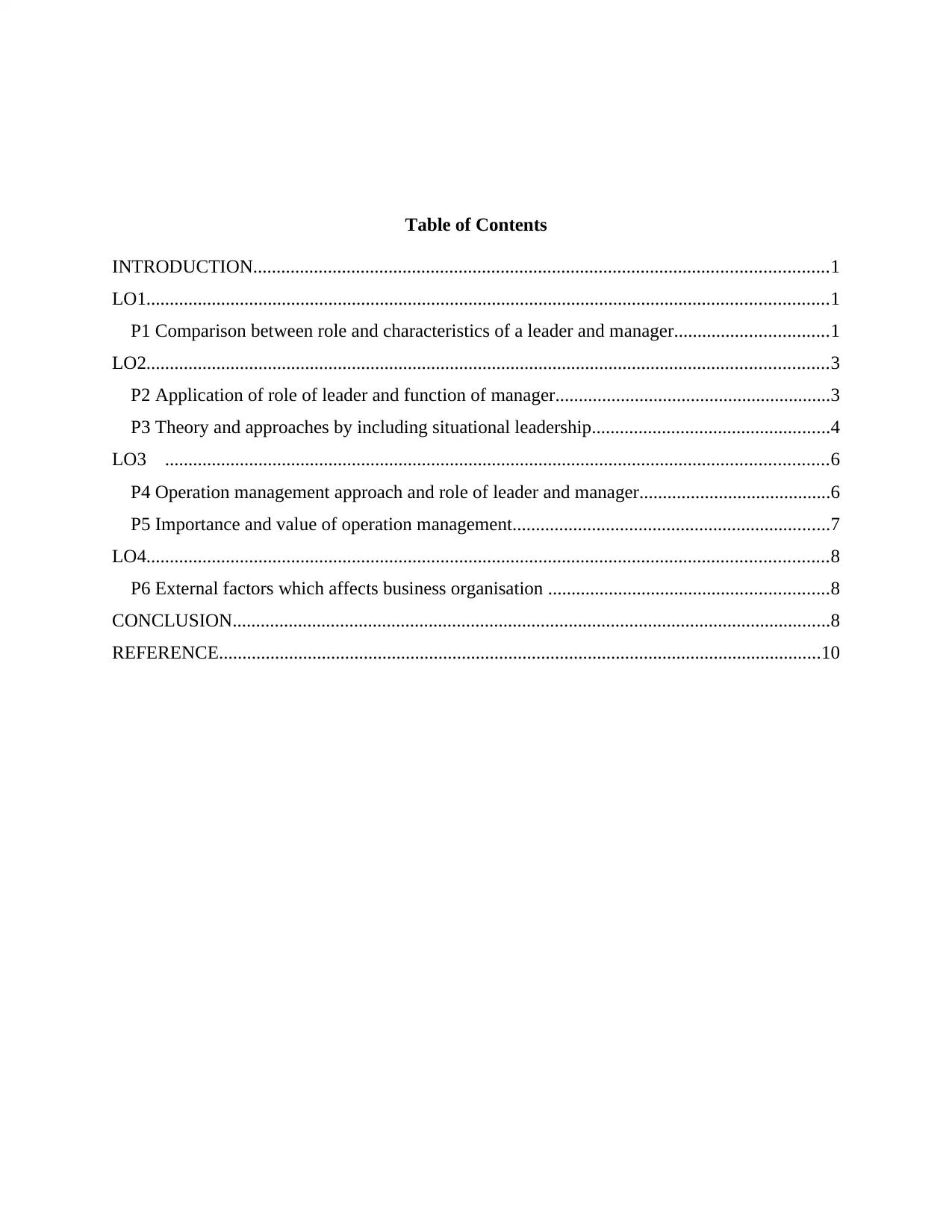
Table of Contents
INTRODUCTION...........................................................................................................................1
LO1..................................................................................................................................................1
P1 Comparison between role and characteristics of a leader and manager.................................1
LO2..................................................................................................................................................3
P2 Application of role of leader and function of manager...........................................................3
P3 Theory and approaches by including situational leadership...................................................4
LO3 ..............................................................................................................................................6
P4 Operation management approach and role of leader and manager.........................................6
P5 Importance and value of operation management....................................................................7
LO4..................................................................................................................................................8
P6 External factors which affects business organisation ............................................................8
CONCLUSION................................................................................................................................8
REFERENCE.................................................................................................................................10
INTRODUCTION...........................................................................................................................1
LO1..................................................................................................................................................1
P1 Comparison between role and characteristics of a leader and manager.................................1
LO2..................................................................................................................................................3
P2 Application of role of leader and function of manager...........................................................3
P3 Theory and approaches by including situational leadership...................................................4
LO3 ..............................................................................................................................................6
P4 Operation management approach and role of leader and manager.........................................6
P5 Importance and value of operation management....................................................................7
LO4..................................................................................................................................................8
P6 External factors which affects business organisation ............................................................8
CONCLUSION................................................................................................................................8
REFERENCE.................................................................................................................................10
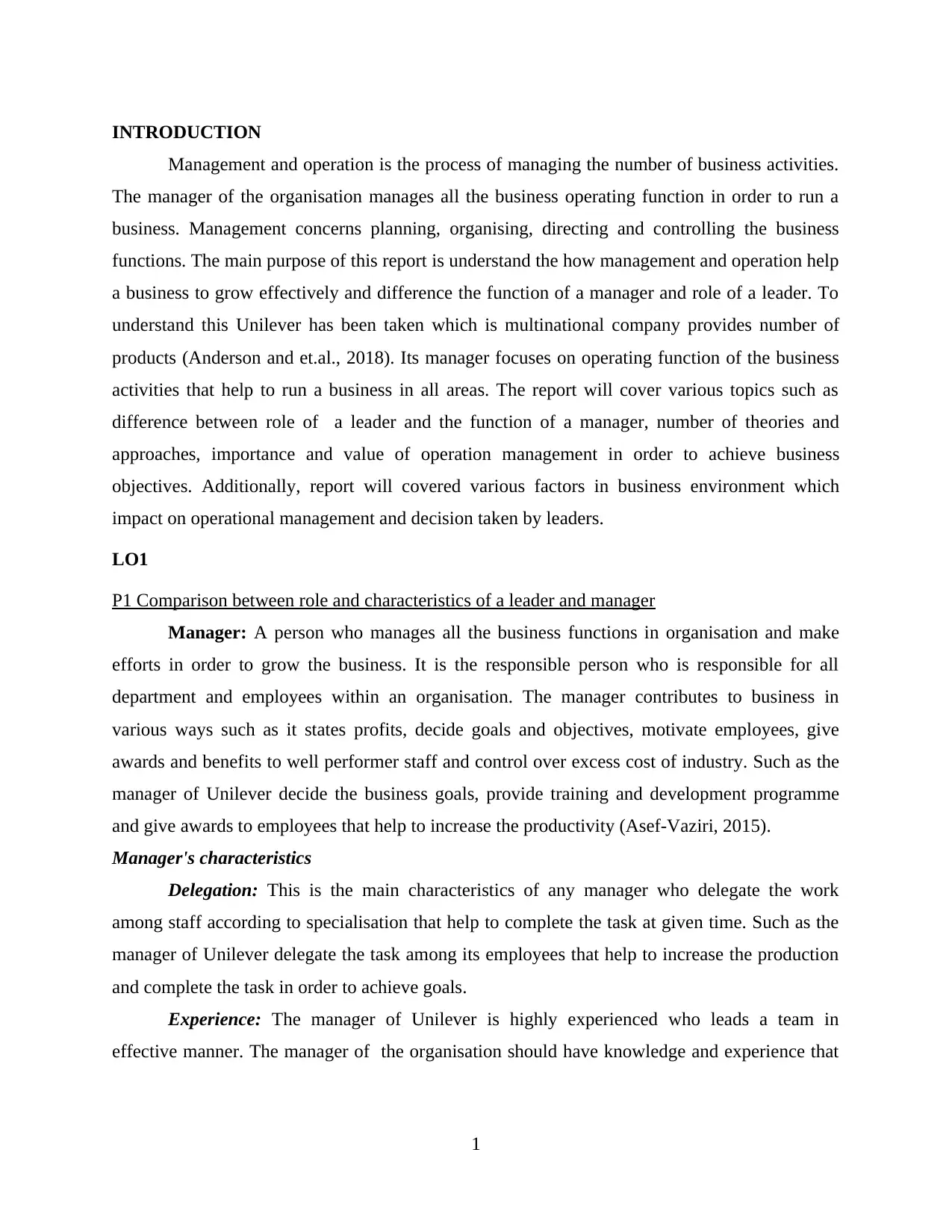
INTRODUCTION
Management and operation is the process of managing the number of business activities.
The manager of the organisation manages all the business operating function in order to run a
business. Management concerns planning, organising, directing and controlling the business
functions. The main purpose of this report is understand the how management and operation help
a business to grow effectively and difference the function of a manager and role of a leader. To
understand this Unilever has been taken which is multinational company provides number of
products (Anderson and et.al., 2018). Its manager focuses on operating function of the business
activities that help to run a business in all areas. The report will cover various topics such as
difference between role of a leader and the function of a manager, number of theories and
approaches, importance and value of operation management in order to achieve business
objectives. Additionally, report will covered various factors in business environment which
impact on operational management and decision taken by leaders.
LO1
P1 Comparison between role and characteristics of a leader and manager
Manager: A person who manages all the business functions in organisation and make
efforts in order to grow the business. It is the responsible person who is responsible for all
department and employees within an organisation. The manager contributes to business in
various ways such as it states profits, decide goals and objectives, motivate employees, give
awards and benefits to well performer staff and control over excess cost of industry. Such as the
manager of Unilever decide the business goals, provide training and development programme
and give awards to employees that help to increase the productivity (Asef‐Vaziri, 2015).
Manager's characteristics
Delegation: This is the main characteristics of any manager who delegate the work
among staff according to specialisation that help to complete the task at given time. Such as the
manager of Unilever delegate the task among its employees that help to increase the production
and complete the task in order to achieve goals.
Experience: The manager of Unilever is highly experienced who leads a team in
effective manner. The manager of the organisation should have knowledge and experience that
1
Management and operation is the process of managing the number of business activities.
The manager of the organisation manages all the business operating function in order to run a
business. Management concerns planning, organising, directing and controlling the business
functions. The main purpose of this report is understand the how management and operation help
a business to grow effectively and difference the function of a manager and role of a leader. To
understand this Unilever has been taken which is multinational company provides number of
products (Anderson and et.al., 2018). Its manager focuses on operating function of the business
activities that help to run a business in all areas. The report will cover various topics such as
difference between role of a leader and the function of a manager, number of theories and
approaches, importance and value of operation management in order to achieve business
objectives. Additionally, report will covered various factors in business environment which
impact on operational management and decision taken by leaders.
LO1
P1 Comparison between role and characteristics of a leader and manager
Manager: A person who manages all the business functions in organisation and make
efforts in order to grow the business. It is the responsible person who is responsible for all
department and employees within an organisation. The manager contributes to business in
various ways such as it states profits, decide goals and objectives, motivate employees, give
awards and benefits to well performer staff and control over excess cost of industry. Such as the
manager of Unilever decide the business goals, provide training and development programme
and give awards to employees that help to increase the productivity (Asef‐Vaziri, 2015).
Manager's characteristics
Delegation: This is the main characteristics of any manager who delegate the work
among staff according to specialisation that help to complete the task at given time. Such as the
manager of Unilever delegate the task among its employees that help to increase the production
and complete the task in order to achieve goals.
Experience: The manager of Unilever is highly experienced who leads a team in
effective manner. The manager of the organisation should have knowledge and experience that
1
⊘ This is a preview!⊘
Do you want full access?
Subscribe today to unlock all pages.

Trusted by 1+ million students worldwide
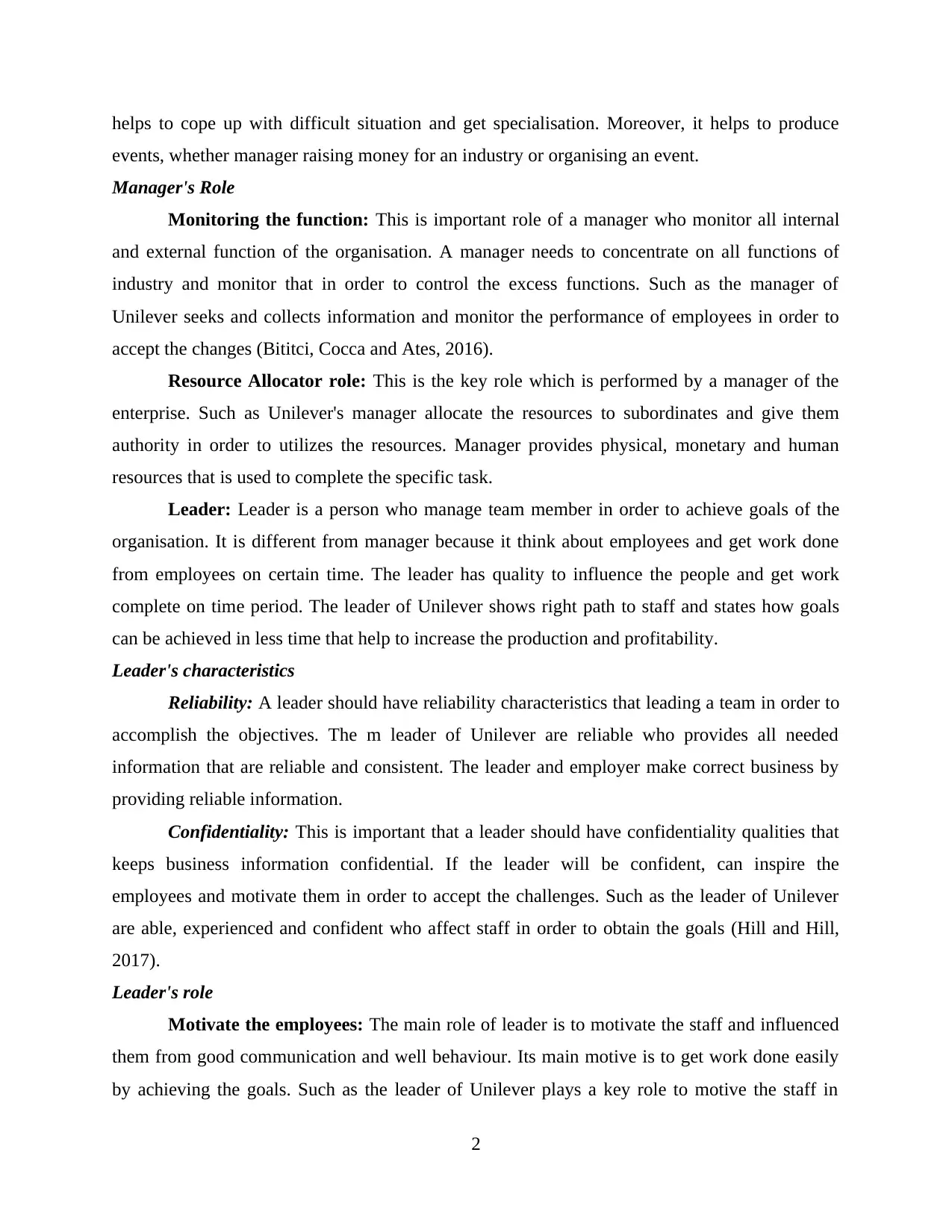
helps to cope up with difficult situation and get specialisation. Moreover, it helps to produce
events, whether manager raising money for an industry or organising an event.
Manager's Role
Monitoring the function: This is important role of a manager who monitor all internal
and external function of the organisation. A manager needs to concentrate on all functions of
industry and monitor that in order to control the excess functions. Such as the manager of
Unilever seeks and collects information and monitor the performance of employees in order to
accept the changes (Bititci, Cocca and Ates, 2016).
Resource Allocator role: This is the key role which is performed by a manager of the
enterprise. Such as Unilever's manager allocate the resources to subordinates and give them
authority in order to utilizes the resources. Manager provides physical, monetary and human
resources that is used to complete the specific task.
Leader: Leader is a person who manage team member in order to achieve goals of the
organisation. It is different from manager because it think about employees and get work done
from employees on certain time. The leader has quality to influence the people and get work
complete on time period. The leader of Unilever shows right path to staff and states how goals
can be achieved in less time that help to increase the production and profitability.
Leader's characteristics
Reliability: A leader should have reliability characteristics that leading a team in order to
accomplish the objectives. The m leader of Unilever are reliable who provides all needed
information that are reliable and consistent. The leader and employer make correct business by
providing reliable information.
Confidentiality: This is important that a leader should have confidentiality qualities that
keeps business information confidential. If the leader will be confident, can inspire the
employees and motivate them in order to accept the challenges. Such as the leader of Unilever
are able, experienced and confident who affect staff in order to obtain the goals (Hill and Hill,
2017).
Leader's role
Motivate the employees: The main role of leader is to motivate the staff and influenced
them from good communication and well behaviour. Its main motive is to get work done easily
by achieving the goals. Such as the leader of Unilever plays a key role to motive the staff in
2
events, whether manager raising money for an industry or organising an event.
Manager's Role
Monitoring the function: This is important role of a manager who monitor all internal
and external function of the organisation. A manager needs to concentrate on all functions of
industry and monitor that in order to control the excess functions. Such as the manager of
Unilever seeks and collects information and monitor the performance of employees in order to
accept the changes (Bititci, Cocca and Ates, 2016).
Resource Allocator role: This is the key role which is performed by a manager of the
enterprise. Such as Unilever's manager allocate the resources to subordinates and give them
authority in order to utilizes the resources. Manager provides physical, monetary and human
resources that is used to complete the specific task.
Leader: Leader is a person who manage team member in order to achieve goals of the
organisation. It is different from manager because it think about employees and get work done
from employees on certain time. The leader has quality to influence the people and get work
complete on time period. The leader of Unilever shows right path to staff and states how goals
can be achieved in less time that help to increase the production and profitability.
Leader's characteristics
Reliability: A leader should have reliability characteristics that leading a team in order to
accomplish the objectives. The m leader of Unilever are reliable who provides all needed
information that are reliable and consistent. The leader and employer make correct business by
providing reliable information.
Confidentiality: This is important that a leader should have confidentiality qualities that
keeps business information confidential. If the leader will be confident, can inspire the
employees and motivate them in order to accept the challenges. Such as the leader of Unilever
are able, experienced and confident who affect staff in order to obtain the goals (Hill and Hill,
2017).
Leader's role
Motivate the employees: The main role of leader is to motivate the staff and influenced
them from good communication and well behaviour. Its main motive is to get work done easily
by achieving the goals. Such as the leader of Unilever plays a key role to motive the staff in
2
Paraphrase This Document
Need a fresh take? Get an instant paraphrase of this document with our AI Paraphraser
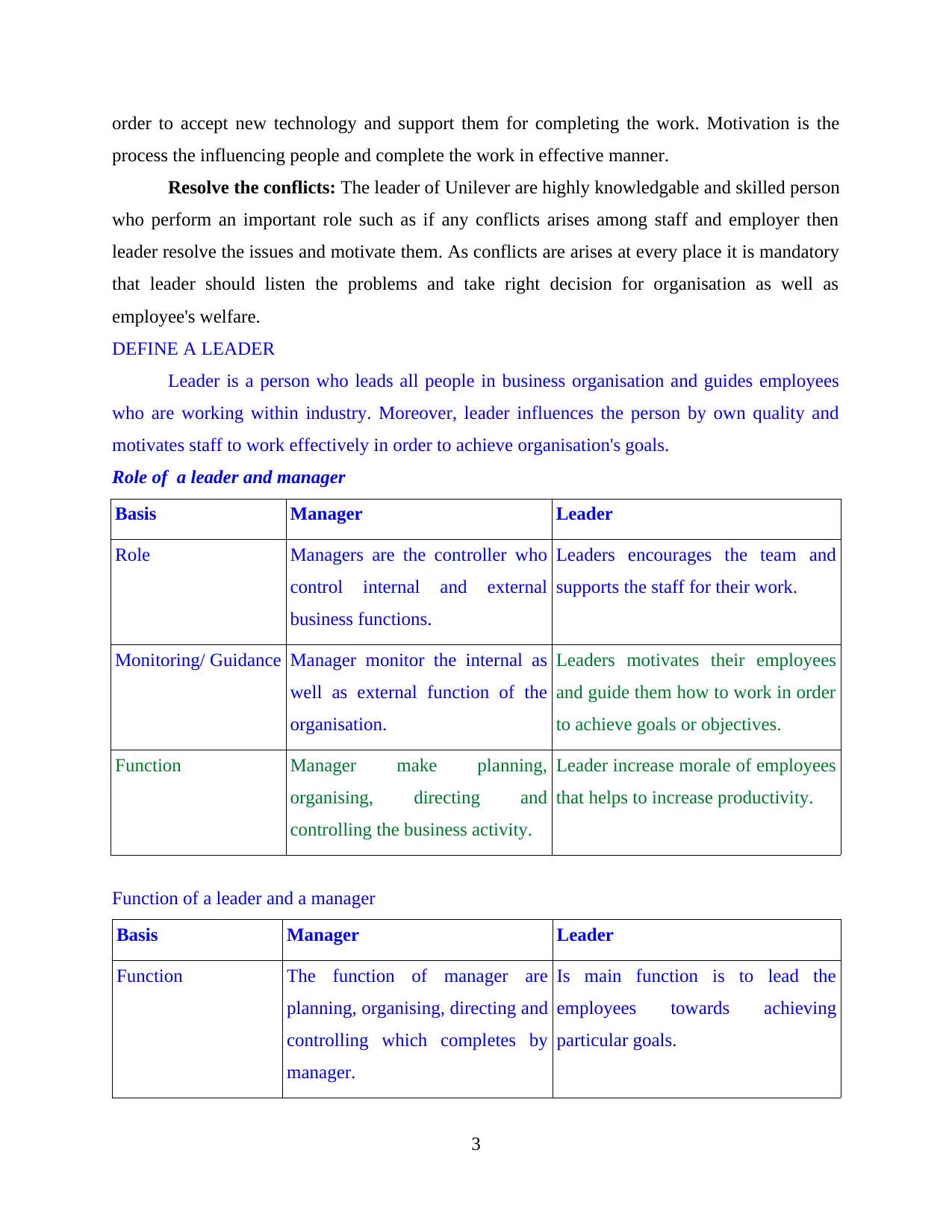
order to accept new technology and support them for completing the work. Motivation is the
process the influencing people and complete the work in effective manner.
Resolve the conflicts: The leader of Unilever are highly knowledgable and skilled person
who perform an important role such as if any conflicts arises among staff and employer then
leader resolve the issues and motivate them. As conflicts are arises at every place it is mandatory
that leader should listen the problems and take right decision for organisation as well as
employee's welfare.
DEFINE A LEADER
Leader is a person who leads all people in business organisation and guides employees
who are working within industry. Moreover, leader influences the person by own quality and
motivates staff to work effectively in order to achieve organisation's goals.
Role of a leader and manager
Basis Manager Leader
Role Managers are the controller who
control internal and external
business functions.
Leaders encourages the team and
supports the staff for their work.
Monitoring/ Guidance Manager monitor the internal as
well as external function of the
organisation.
Leaders motivates their employees
and guide them how to work in order
to achieve goals or objectives.
Function Manager make planning,
organising, directing and
controlling the business activity.
Leader increase morale of employees
that helps to increase productivity.
Function of a leader and a manager
Basis Manager Leader
Function The function of manager are
planning, organising, directing and
controlling which completes by
manager.
Is main function is to lead the
employees towards achieving
particular goals.
3
process the influencing people and complete the work in effective manner.
Resolve the conflicts: The leader of Unilever are highly knowledgable and skilled person
who perform an important role such as if any conflicts arises among staff and employer then
leader resolve the issues and motivate them. As conflicts are arises at every place it is mandatory
that leader should listen the problems and take right decision for organisation as well as
employee's welfare.
DEFINE A LEADER
Leader is a person who leads all people in business organisation and guides employees
who are working within industry. Moreover, leader influences the person by own quality and
motivates staff to work effectively in order to achieve organisation's goals.
Role of a leader and manager
Basis Manager Leader
Role Managers are the controller who
control internal and external
business functions.
Leaders encourages the team and
supports the staff for their work.
Monitoring/ Guidance Manager monitor the internal as
well as external function of the
organisation.
Leaders motivates their employees
and guide them how to work in order
to achieve goals or objectives.
Function Manager make planning,
organising, directing and
controlling the business activity.
Leader increase morale of employees
that helps to increase productivity.
Function of a leader and a manager
Basis Manager Leader
Function The function of manager are
planning, organising, directing and
controlling which completes by
manager.
Is main function is to lead the
employees towards achieving
particular goals.
3
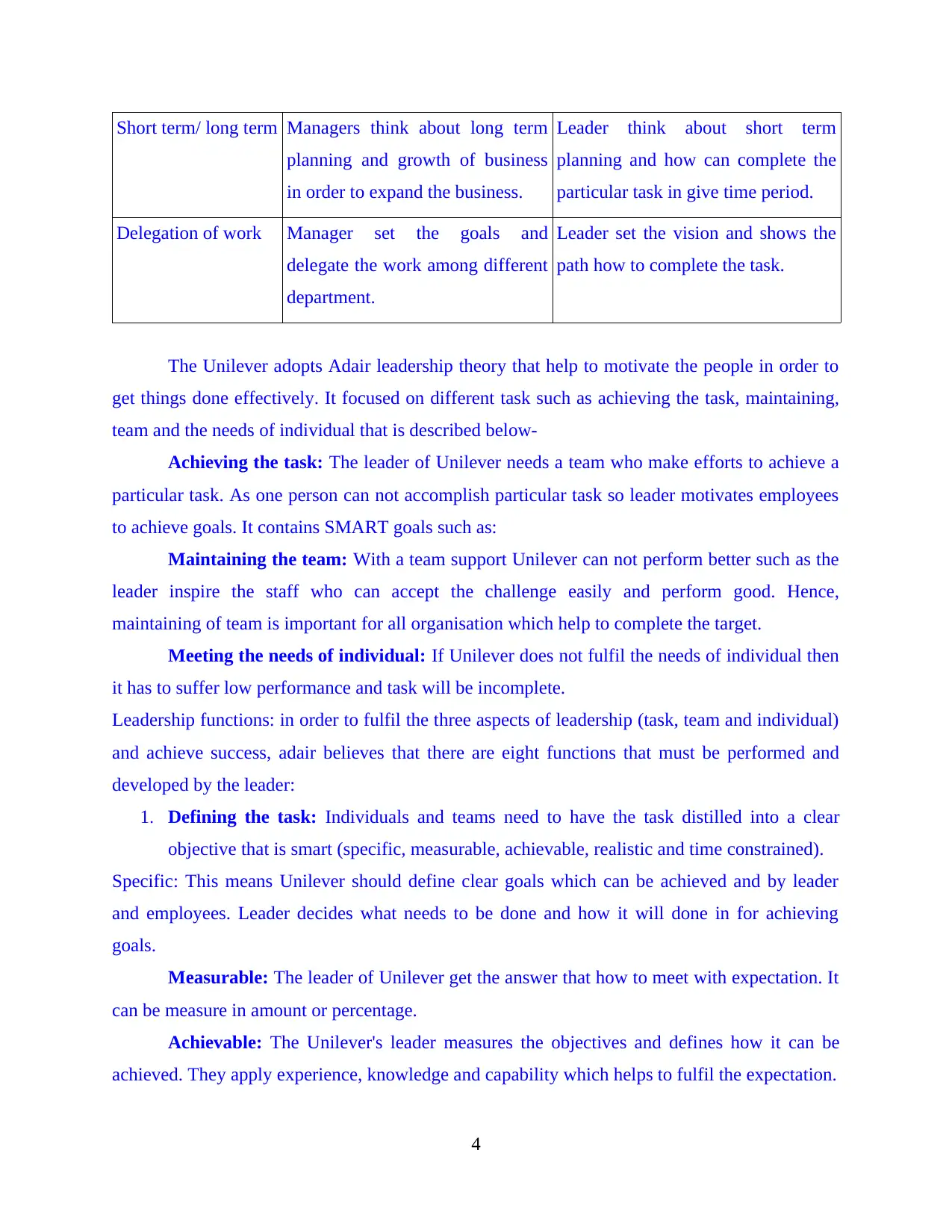
Short term/ long term Managers think about long term
planning and growth of business
in order to expand the business.
Leader think about short term
planning and how can complete the
particular task in give time period.
Delegation of work Manager set the goals and
delegate the work among different
department.
Leader set the vision and shows the
path how to complete the task.
The Unilever adopts Adair leadership theory that help to motivate the people in order to
get things done effectively. It focused on different task such as achieving the task, maintaining,
team and the needs of individual that is described below-
Achieving the task: The leader of Unilever needs a team who make efforts to achieve a
particular task. As one person can not accomplish particular task so leader motivates employees
to achieve goals. It contains SMART goals such as:
Maintaining the team: With a team support Unilever can not perform better such as the
leader inspire the staff who can accept the challenge easily and perform good. Hence,
maintaining of team is important for all organisation which help to complete the target.
Meeting the needs of individual: If Unilever does not fulfil the needs of individual then
it has to suffer low performance and task will be incomplete.
Leadership functions: in order to fulfil the three aspects of leadership (task, team and individual)
and achieve success, adair believes that there are eight functions that must be performed and
developed by the leader:
1. Defining the task: Individuals and teams need to have the task distilled into a clear
objective that is smart (specific, measurable, achievable, realistic and time constrained).
Specific: This means Unilever should define clear goals which can be achieved and by leader
and employees. Leader decides what needs to be done and how it will done in for achieving
goals.
Measurable: The leader of Unilever get the answer that how to meet with expectation. It
can be measure in amount or percentage.
Achievable: The Unilever's leader measures the objectives and defines how it can be
achieved. They apply experience, knowledge and capability which helps to fulfil the expectation.
4
planning and growth of business
in order to expand the business.
Leader think about short term
planning and how can complete the
particular task in give time period.
Delegation of work Manager set the goals and
delegate the work among different
department.
Leader set the vision and shows the
path how to complete the task.
The Unilever adopts Adair leadership theory that help to motivate the people in order to
get things done effectively. It focused on different task such as achieving the task, maintaining,
team and the needs of individual that is described below-
Achieving the task: The leader of Unilever needs a team who make efforts to achieve a
particular task. As one person can not accomplish particular task so leader motivates employees
to achieve goals. It contains SMART goals such as:
Maintaining the team: With a team support Unilever can not perform better such as the
leader inspire the staff who can accept the challenge easily and perform good. Hence,
maintaining of team is important for all organisation which help to complete the target.
Meeting the needs of individual: If Unilever does not fulfil the needs of individual then
it has to suffer low performance and task will be incomplete.
Leadership functions: in order to fulfil the three aspects of leadership (task, team and individual)
and achieve success, adair believes that there are eight functions that must be performed and
developed by the leader:
1. Defining the task: Individuals and teams need to have the task distilled into a clear
objective that is smart (specific, measurable, achievable, realistic and time constrained).
Specific: This means Unilever should define clear goals which can be achieved and by leader
and employees. Leader decides what needs to be done and how it will done in for achieving
goals.
Measurable: The leader of Unilever get the answer that how to meet with expectation. It
can be measure in amount or percentage.
Achievable: The Unilever's leader measures the objectives and defines how it can be
achieved. They apply experience, knowledge and capability which helps to fulfil the expectation.
4
⊘ This is a preview!⊘
Do you want full access?
Subscribe today to unlock all pages.

Trusted by 1+ million students worldwide
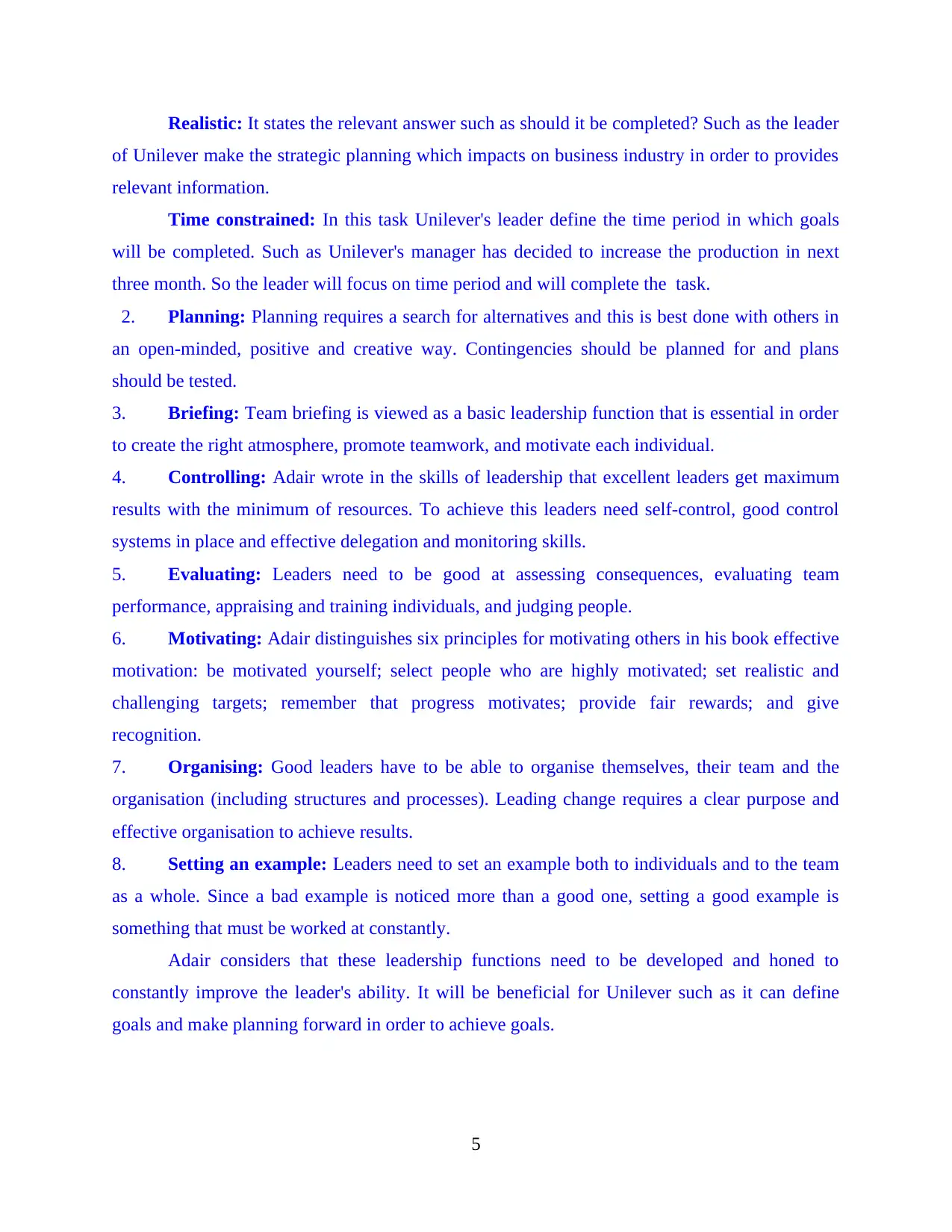
Realistic: It states the relevant answer such as should it be completed? Such as the leader
of Unilever make the strategic planning which impacts on business industry in order to provides
relevant information.
Time constrained: In this task Unilever's leader define the time period in which goals
will be completed. Such as Unilever's manager has decided to increase the production in next
three month. So the leader will focus on time period and will complete the task.
2. Planning: Planning requires a search for alternatives and this is best done with others in
an open-minded, positive and creative way. Contingencies should be planned for and plans
should be tested.
3. Briefing: Team briefing is viewed as a basic leadership function that is essential in order
to create the right atmosphere, promote teamwork, and motivate each individual.
4. Controlling: Adair wrote in the skills of leadership that excellent leaders get maximum
results with the minimum of resources. To achieve this leaders need self-control, good control
systems in place and effective delegation and monitoring skills.
5. Evaluating: Leaders need to be good at assessing consequences, evaluating team
performance, appraising and training individuals, and judging people.
6. Motivating: Adair distinguishes six principles for motivating others in his book effective
motivation: be motivated yourself; select people who are highly motivated; set realistic and
challenging targets; remember that progress motivates; provide fair rewards; and give
recognition.
7. Organising: Good leaders have to be able to organise themselves, their team and the
organisation (including structures and processes). Leading change requires a clear purpose and
effective organisation to achieve results.
8. Setting an example: Leaders need to set an example both to individuals and to the team
as a whole. Since a bad example is noticed more than a good one, setting a good example is
something that must be worked at constantly.
Adair considers that these leadership functions need to be developed and honed to
constantly improve the leader's ability. It will be beneficial for Unilever such as it can define
goals and make planning forward in order to achieve goals.
5
of Unilever make the strategic planning which impacts on business industry in order to provides
relevant information.
Time constrained: In this task Unilever's leader define the time period in which goals
will be completed. Such as Unilever's manager has decided to increase the production in next
three month. So the leader will focus on time period and will complete the task.
2. Planning: Planning requires a search for alternatives and this is best done with others in
an open-minded, positive and creative way. Contingencies should be planned for and plans
should be tested.
3. Briefing: Team briefing is viewed as a basic leadership function that is essential in order
to create the right atmosphere, promote teamwork, and motivate each individual.
4. Controlling: Adair wrote in the skills of leadership that excellent leaders get maximum
results with the minimum of resources. To achieve this leaders need self-control, good control
systems in place and effective delegation and monitoring skills.
5. Evaluating: Leaders need to be good at assessing consequences, evaluating team
performance, appraising and training individuals, and judging people.
6. Motivating: Adair distinguishes six principles for motivating others in his book effective
motivation: be motivated yourself; select people who are highly motivated; set realistic and
challenging targets; remember that progress motivates; provide fair rewards; and give
recognition.
7. Organising: Good leaders have to be able to organise themselves, their team and the
organisation (including structures and processes). Leading change requires a clear purpose and
effective organisation to achieve results.
8. Setting an example: Leaders need to set an example both to individuals and to the team
as a whole. Since a bad example is noticed more than a good one, setting a good example is
something that must be worked at constantly.
Adair considers that these leadership functions need to be developed and honed to
constantly improve the leader's ability. It will be beneficial for Unilever such as it can define
goals and make planning forward in order to achieve goals.
5
Paraphrase This Document
Need a fresh take? Get an instant paraphrase of this document with our AI Paraphraser
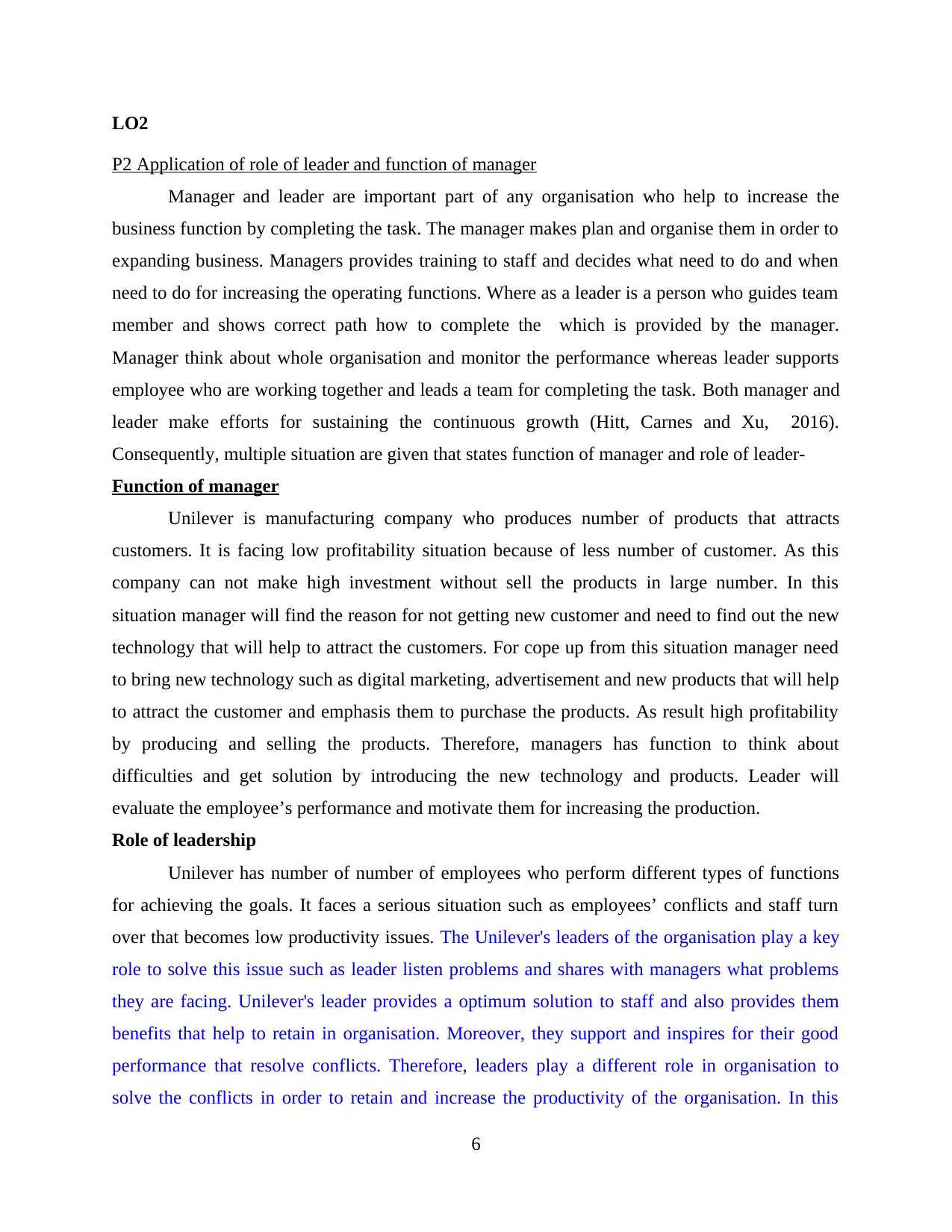
LO2
P2 Application of role of leader and function of manager
Manager and leader are important part of any organisation who help to increase the
business function by completing the task. The manager makes plan and organise them in order to
expanding business. Managers provides training to staff and decides what need to do and when
need to do for increasing the operating functions. Where as a leader is a person who guides team
member and shows correct path how to complete the which is provided by the manager.
Manager think about whole organisation and monitor the performance whereas leader supports
employee who are working together and leads a team for completing the task. Both manager and
leader make efforts for sustaining the continuous growth (Hitt, Carnes and Xu, 2016).
Consequently, multiple situation are given that states function of manager and role of leader-
Function of manager
Unilever is manufacturing company who produces number of products that attracts
customers. It is facing low profitability situation because of less number of customer. As this
company can not make high investment without sell the products in large number. In this
situation manager will find the reason for not getting new customer and need to find out the new
technology that will help to attract the customers. For cope up from this situation manager need
to bring new technology such as digital marketing, advertisement and new products that will help
to attract the customer and emphasis them to purchase the products. As result high profitability
by producing and selling the products. Therefore, managers has function to think about
difficulties and get solution by introducing the new technology and products. Leader will
evaluate the employee’s performance and motivate them for increasing the production.
Role of leadership
Unilever has number of number of employees who perform different types of functions
for achieving the goals. It faces a serious situation such as employees’ conflicts and staff turn
over that becomes low productivity issues. The Unilever's leaders of the organisation play a key
role to solve this issue such as leader listen problems and shares with managers what problems
they are facing. Unilever's leader provides a optimum solution to staff and also provides them
benefits that help to retain in organisation. Moreover, they support and inspires for their good
performance that resolve conflicts. Therefore, leaders play a different role in organisation to
solve the conflicts in order to retain and increase the productivity of the organisation. In this
6
P2 Application of role of leader and function of manager
Manager and leader are important part of any organisation who help to increase the
business function by completing the task. The manager makes plan and organise them in order to
expanding business. Managers provides training to staff and decides what need to do and when
need to do for increasing the operating functions. Where as a leader is a person who guides team
member and shows correct path how to complete the which is provided by the manager.
Manager think about whole organisation and monitor the performance whereas leader supports
employee who are working together and leads a team for completing the task. Both manager and
leader make efforts for sustaining the continuous growth (Hitt, Carnes and Xu, 2016).
Consequently, multiple situation are given that states function of manager and role of leader-
Function of manager
Unilever is manufacturing company who produces number of products that attracts
customers. It is facing low profitability situation because of less number of customer. As this
company can not make high investment without sell the products in large number. In this
situation manager will find the reason for not getting new customer and need to find out the new
technology that will help to attract the customers. For cope up from this situation manager need
to bring new technology such as digital marketing, advertisement and new products that will help
to attract the customer and emphasis them to purchase the products. As result high profitability
by producing and selling the products. Therefore, managers has function to think about
difficulties and get solution by introducing the new technology and products. Leader will
evaluate the employee’s performance and motivate them for increasing the production.
Role of leadership
Unilever has number of number of employees who perform different types of functions
for achieving the goals. It faces a serious situation such as employees’ conflicts and staff turn
over that becomes low productivity issues. The Unilever's leaders of the organisation play a key
role to solve this issue such as leader listen problems and shares with managers what problems
they are facing. Unilever's leader provides a optimum solution to staff and also provides them
benefits that help to retain in organisation. Moreover, they support and inspires for their good
performance that resolve conflicts. Therefore, leaders play a different role in organisation to
solve the conflicts in order to retain and increase the productivity of the organisation. In this
6
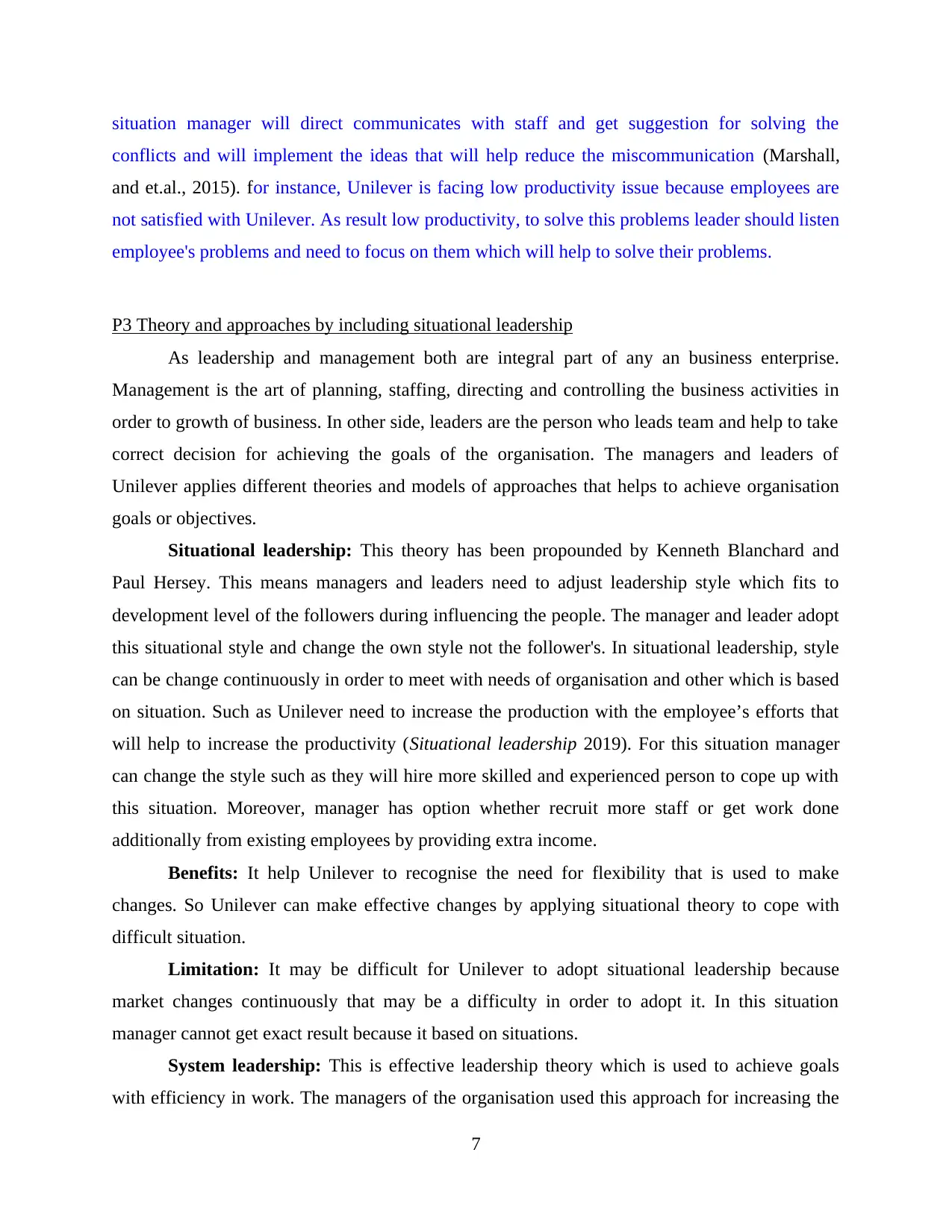
situation manager will direct communicates with staff and get suggestion for solving the
conflicts and will implement the ideas that will help reduce the miscommunication (Marshall,
and et.al., 2015). for instance, Unilever is facing low productivity issue because employees are
not satisfied with Unilever. As result low productivity, to solve this problems leader should listen
employee's problems and need to focus on them which will help to solve their problems.
P3 Theory and approaches by including situational leadership
As leadership and management both are integral part of any an business enterprise.
Management is the art of planning, staffing, directing and controlling the business activities in
order to growth of business. In other side, leaders are the person who leads team and help to take
correct decision for achieving the goals of the organisation. The managers and leaders of
Unilever applies different theories and models of approaches that helps to achieve organisation
goals or objectives.
Situational leadership: This theory has been propounded by Kenneth Blanchard and
Paul Hersey. This means managers and leaders need to adjust leadership style which fits to
development level of the followers during influencing the people. The manager and leader adopt
this situational style and change the own style not the follower's. In situational leadership, style
can be change continuously in order to meet with needs of organisation and other which is based
on situation. Such as Unilever need to increase the production with the employee’s efforts that
will help to increase the productivity (Situational leadership 2019). For this situation manager
can change the style such as they will hire more skilled and experienced person to cope up with
this situation. Moreover, manager has option whether recruit more staff or get work done
additionally from existing employees by providing extra income.
Benefits: It help Unilever to recognise the need for flexibility that is used to make
changes. So Unilever can make effective changes by applying situational theory to cope with
difficult situation.
Limitation: It may be difficult for Unilever to adopt situational leadership because
market changes continuously that may be a difficulty in order to adopt it. In this situation
manager cannot get exact result because it based on situations.
System leadership: This is effective leadership theory which is used to achieve goals
with efficiency in work. The managers of the organisation used this approach for increasing the
7
conflicts and will implement the ideas that will help reduce the miscommunication (Marshall,
and et.al., 2015). for instance, Unilever is facing low productivity issue because employees are
not satisfied with Unilever. As result low productivity, to solve this problems leader should listen
employee's problems and need to focus on them which will help to solve their problems.
P3 Theory and approaches by including situational leadership
As leadership and management both are integral part of any an business enterprise.
Management is the art of planning, staffing, directing and controlling the business activities in
order to growth of business. In other side, leaders are the person who leads team and help to take
correct decision for achieving the goals of the organisation. The managers and leaders of
Unilever applies different theories and models of approaches that helps to achieve organisation
goals or objectives.
Situational leadership: This theory has been propounded by Kenneth Blanchard and
Paul Hersey. This means managers and leaders need to adjust leadership style which fits to
development level of the followers during influencing the people. The manager and leader adopt
this situational style and change the own style not the follower's. In situational leadership, style
can be change continuously in order to meet with needs of organisation and other which is based
on situation. Such as Unilever need to increase the production with the employee’s efforts that
will help to increase the productivity (Situational leadership 2019). For this situation manager
can change the style such as they will hire more skilled and experienced person to cope up with
this situation. Moreover, manager has option whether recruit more staff or get work done
additionally from existing employees by providing extra income.
Benefits: It help Unilever to recognise the need for flexibility that is used to make
changes. So Unilever can make effective changes by applying situational theory to cope with
difficult situation.
Limitation: It may be difficult for Unilever to adopt situational leadership because
market changes continuously that may be a difficulty in order to adopt it. In this situation
manager cannot get exact result because it based on situations.
System leadership: This is effective leadership theory which is used to achieve goals
with efficiency in work. The managers of the organisation used this approach for increasing the
7
⊘ This is a preview!⊘
Do you want full access?
Subscribe today to unlock all pages.

Trusted by 1+ million students worldwide
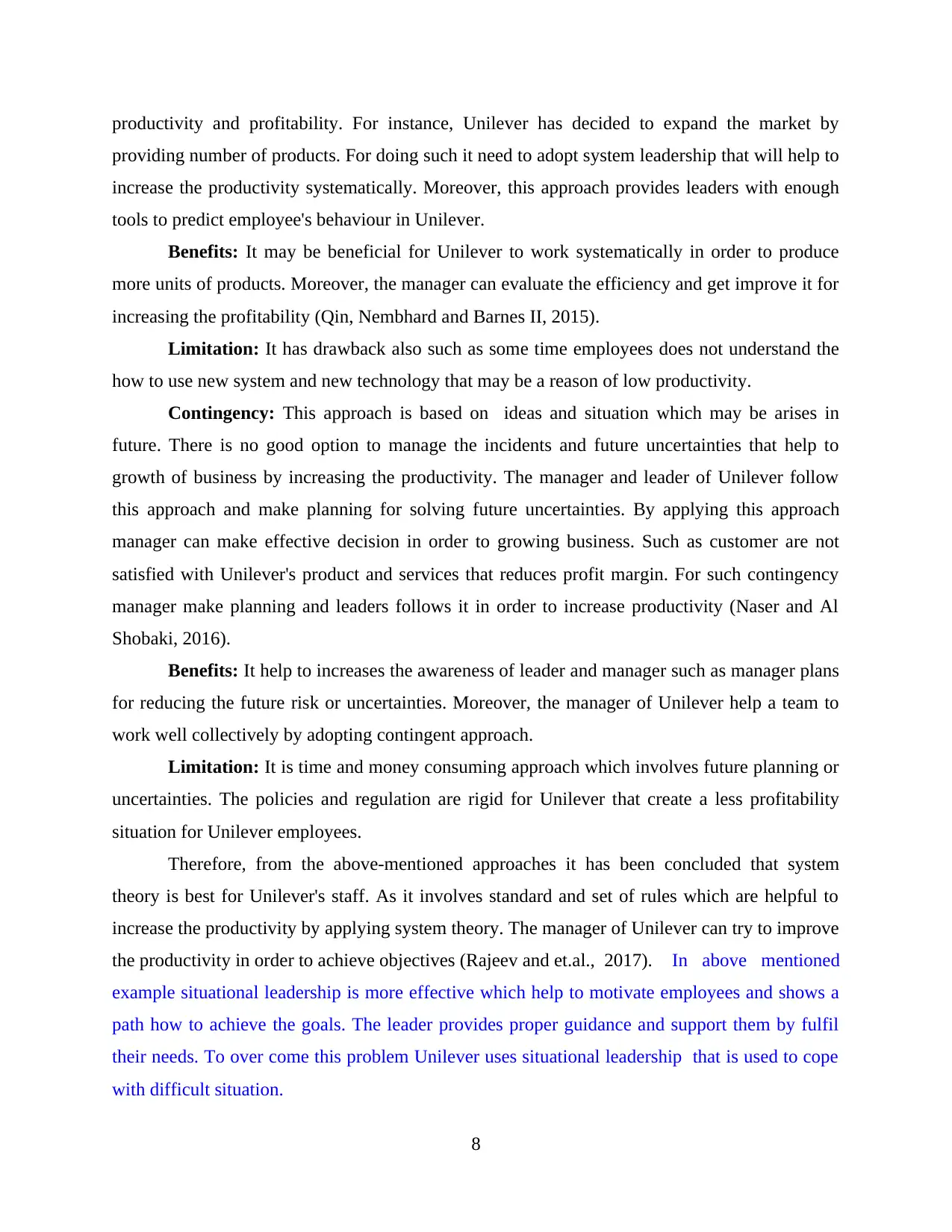
productivity and profitability. For instance, Unilever has decided to expand the market by
providing number of products. For doing such it need to adopt system leadership that will help to
increase the productivity systematically. Moreover, this approach provides leaders with enough
tools to predict employee's behaviour in Unilever.
Benefits: It may be beneficial for Unilever to work systematically in order to produce
more units of products. Moreover, the manager can evaluate the efficiency and get improve it for
increasing the profitability (Qin, Nembhard and Barnes II, 2015).
Limitation: It has drawback also such as some time employees does not understand the
how to use new system and new technology that may be a reason of low productivity.
Contingency: This approach is based on ideas and situation which may be arises in
future. There is no good option to manage the incidents and future uncertainties that help to
growth of business by increasing the productivity. The manager and leader of Unilever follow
this approach and make planning for solving future uncertainties. By applying this approach
manager can make effective decision in order to growing business. Such as customer are not
satisfied with Unilever's product and services that reduces profit margin. For such contingency
manager make planning and leaders follows it in order to increase productivity (Naser and Al
Shobaki, 2016).
Benefits: It help to increases the awareness of leader and manager such as manager plans
for reducing the future risk or uncertainties. Moreover, the manager of Unilever help a team to
work well collectively by adopting contingent approach.
Limitation: It is time and money consuming approach which involves future planning or
uncertainties. The policies and regulation are rigid for Unilever that create a less profitability
situation for Unilever employees.
Therefore, from the above-mentioned approaches it has been concluded that system
theory is best for Unilever's staff. As it involves standard and set of rules which are helpful to
increase the productivity by applying system theory. The manager of Unilever can try to improve
the productivity in order to achieve objectives (Rajeev and et.al., 2017). In above mentioned
example situational leadership is more effective which help to motivate employees and shows a
path how to achieve the goals. The leader provides proper guidance and support them by fulfil
their needs. To over come this problem Unilever uses situational leadership that is used to cope
with difficult situation.
8
providing number of products. For doing such it need to adopt system leadership that will help to
increase the productivity systematically. Moreover, this approach provides leaders with enough
tools to predict employee's behaviour in Unilever.
Benefits: It may be beneficial for Unilever to work systematically in order to produce
more units of products. Moreover, the manager can evaluate the efficiency and get improve it for
increasing the profitability (Qin, Nembhard and Barnes II, 2015).
Limitation: It has drawback also such as some time employees does not understand the
how to use new system and new technology that may be a reason of low productivity.
Contingency: This approach is based on ideas and situation which may be arises in
future. There is no good option to manage the incidents and future uncertainties that help to
growth of business by increasing the productivity. The manager and leader of Unilever follow
this approach and make planning for solving future uncertainties. By applying this approach
manager can make effective decision in order to growing business. Such as customer are not
satisfied with Unilever's product and services that reduces profit margin. For such contingency
manager make planning and leaders follows it in order to increase productivity (Naser and Al
Shobaki, 2016).
Benefits: It help to increases the awareness of leader and manager such as manager plans
for reducing the future risk or uncertainties. Moreover, the manager of Unilever help a team to
work well collectively by adopting contingent approach.
Limitation: It is time and money consuming approach which involves future planning or
uncertainties. The policies and regulation are rigid for Unilever that create a less profitability
situation for Unilever employees.
Therefore, from the above-mentioned approaches it has been concluded that system
theory is best for Unilever's staff. As it involves standard and set of rules which are helpful to
increase the productivity by applying system theory. The manager of Unilever can try to improve
the productivity in order to achieve objectives (Rajeev and et.al., 2017). In above mentioned
example situational leadership is more effective which help to motivate employees and shows a
path how to achieve the goals. The leader provides proper guidance and support them by fulfil
their needs. To over come this problem Unilever uses situational leadership that is used to cope
with difficult situation.
8
Paraphrase This Document
Need a fresh take? Get an instant paraphrase of this document with our AI Paraphraser
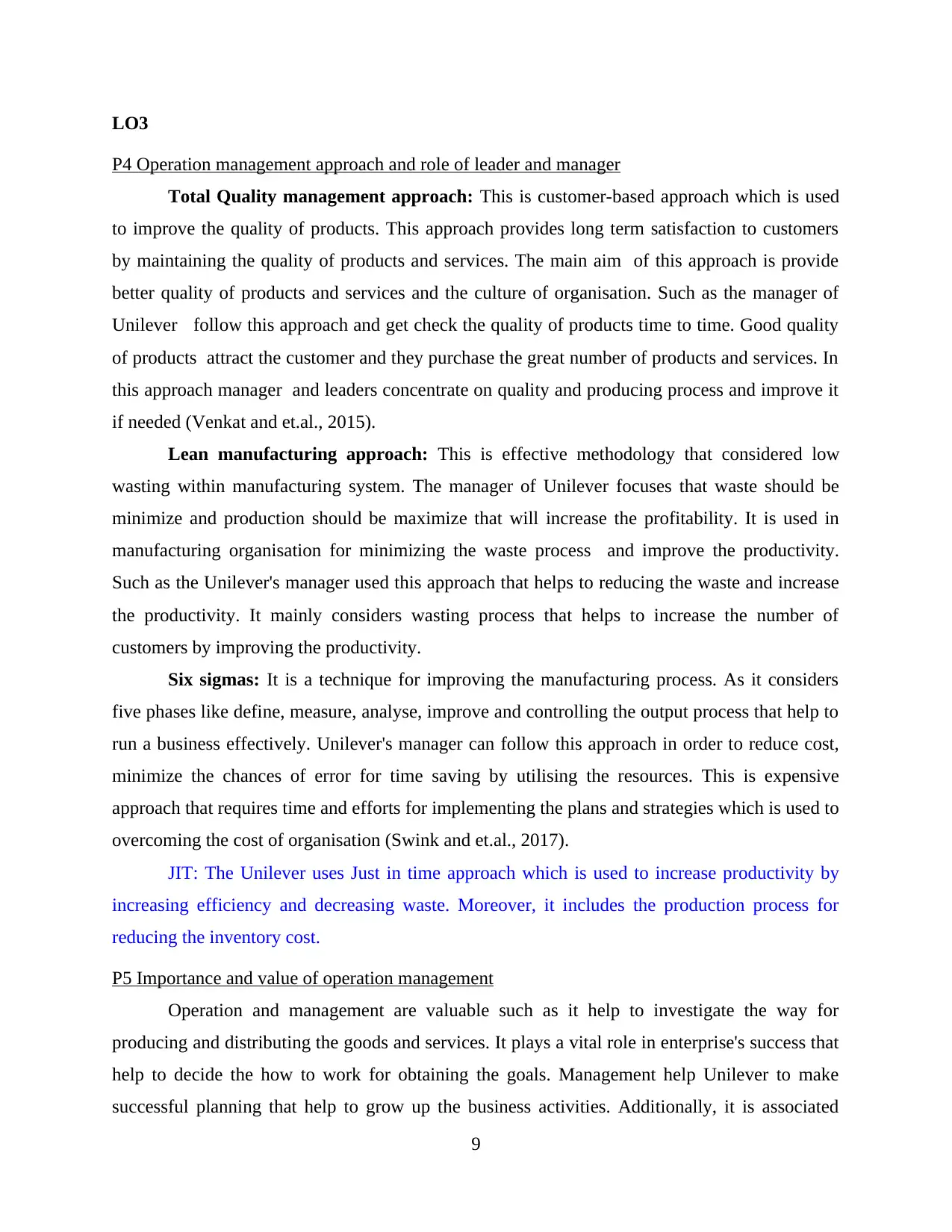
LO3
P4 Operation management approach and role of leader and manager
Total Quality management approach: This is customer-based approach which is used
to improve the quality of products. This approach provides long term satisfaction to customers
by maintaining the quality of products and services. The main aim of this approach is provide
better quality of products and services and the culture of organisation. Such as the manager of
Unilever follow this approach and get check the quality of products time to time. Good quality
of products attract the customer and they purchase the great number of products and services. In
this approach manager and leaders concentrate on quality and producing process and improve it
if needed (Venkat and et.al., 2015).
Lean manufacturing approach: This is effective methodology that considered low
wasting within manufacturing system. The manager of Unilever focuses that waste should be
minimize and production should be maximize that will increase the profitability. It is used in
manufacturing organisation for minimizing the waste process and improve the productivity.
Such as the Unilever's manager used this approach that helps to reducing the waste and increase
the productivity. It mainly considers wasting process that helps to increase the number of
customers by improving the productivity.
Six sigmas: It is a technique for improving the manufacturing process. As it considers
five phases like define, measure, analyse, improve and controlling the output process that help to
run a business effectively. Unilever's manager can follow this approach in order to reduce cost,
minimize the chances of error for time saving by utilising the resources. This is expensive
approach that requires time and efforts for implementing the plans and strategies which is used to
overcoming the cost of organisation (Swink and et.al., 2017).
JIT: The Unilever uses Just in time approach which is used to increase productivity by
increasing efficiency and decreasing waste. Moreover, it includes the production process for
reducing the inventory cost.
P5 Importance and value of operation management
Operation and management are valuable such as it help to investigate the way for
producing and distributing the goods and services. It plays a vital role in enterprise's success that
help to decide the how to work for obtaining the goals. Management help Unilever to make
successful planning that help to grow up the business activities. Additionally, it is associated
9
P4 Operation management approach and role of leader and manager
Total Quality management approach: This is customer-based approach which is used
to improve the quality of products. This approach provides long term satisfaction to customers
by maintaining the quality of products and services. The main aim of this approach is provide
better quality of products and services and the culture of organisation. Such as the manager of
Unilever follow this approach and get check the quality of products time to time. Good quality
of products attract the customer and they purchase the great number of products and services. In
this approach manager and leaders concentrate on quality and producing process and improve it
if needed (Venkat and et.al., 2015).
Lean manufacturing approach: This is effective methodology that considered low
wasting within manufacturing system. The manager of Unilever focuses that waste should be
minimize and production should be maximize that will increase the profitability. It is used in
manufacturing organisation for minimizing the waste process and improve the productivity.
Such as the Unilever's manager used this approach that helps to reducing the waste and increase
the productivity. It mainly considers wasting process that helps to increase the number of
customers by improving the productivity.
Six sigmas: It is a technique for improving the manufacturing process. As it considers
five phases like define, measure, analyse, improve and controlling the output process that help to
run a business effectively. Unilever's manager can follow this approach in order to reduce cost,
minimize the chances of error for time saving by utilising the resources. This is expensive
approach that requires time and efforts for implementing the plans and strategies which is used to
overcoming the cost of organisation (Swink and et.al., 2017).
JIT: The Unilever uses Just in time approach which is used to increase productivity by
increasing efficiency and decreasing waste. Moreover, it includes the production process for
reducing the inventory cost.
P5 Importance and value of operation management
Operation and management are valuable such as it help to investigate the way for
producing and distributing the goods and services. It plays a vital role in enterprise's success that
help to decide the how to work for obtaining the goals. Management help Unilever to make
successful planning that help to grow up the business activities. Additionally, it is associated
9
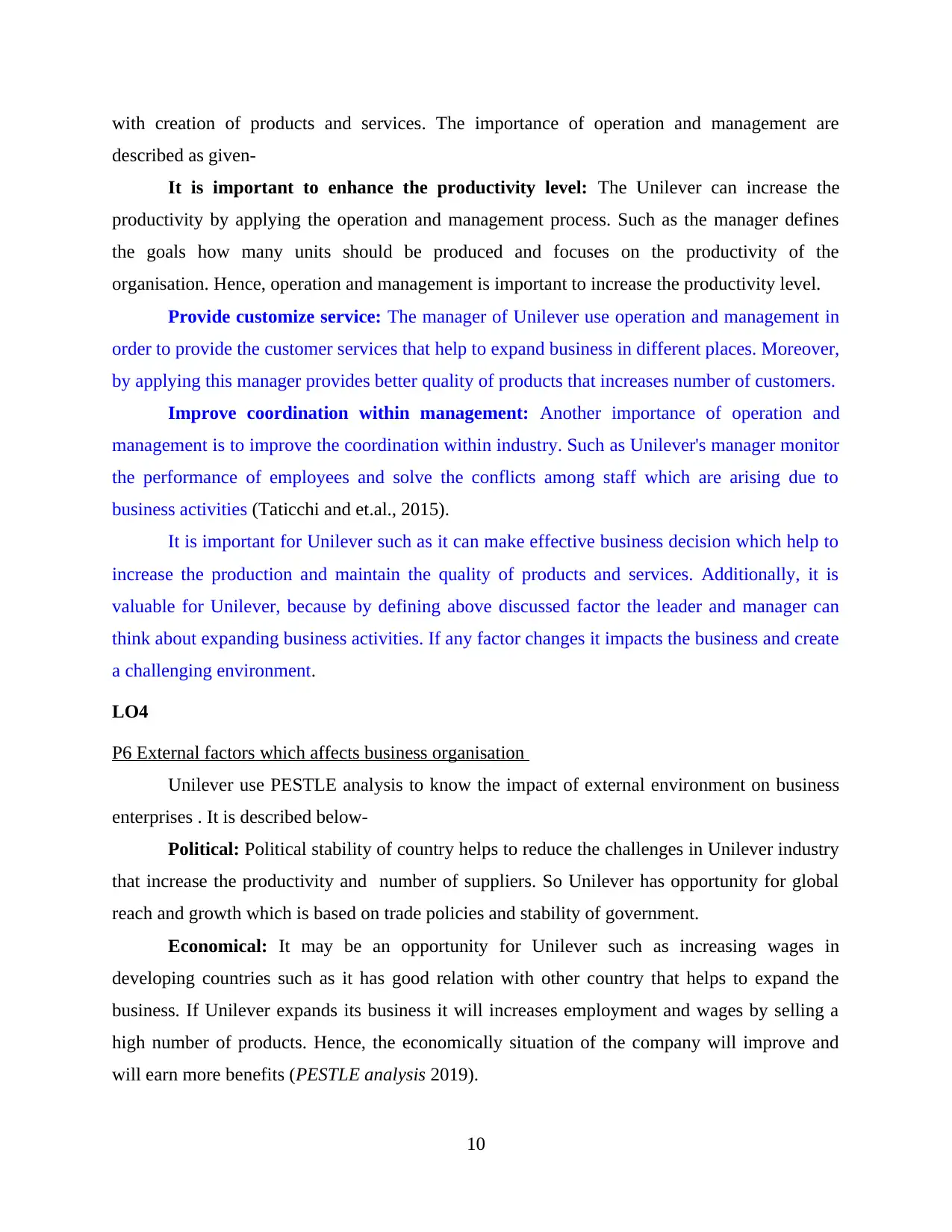
with creation of products and services. The importance of operation and management are
described as given-
It is important to enhance the productivity level: The Unilever can increase the
productivity by applying the operation and management process. Such as the manager defines
the goals how many units should be produced and focuses on the productivity of the
organisation. Hence, operation and management is important to increase the productivity level.
Provide customize service: The manager of Unilever use operation and management in
order to provide the customer services that help to expand business in different places. Moreover,
by applying this manager provides better quality of products that increases number of customers.
Improve coordination within management: Another importance of operation and
management is to improve the coordination within industry. Such as Unilever's manager monitor
the performance of employees and solve the conflicts among staff which are arising due to
business activities (Taticchi and et.al., 2015).
It is important for Unilever such as it can make effective business decision which help to
increase the production and maintain the quality of products and services. Additionally, it is
valuable for Unilever, because by defining above discussed factor the leader and manager can
think about expanding business activities. If any factor changes it impacts the business and create
a challenging environment.
LO4
P6 External factors which affects business organisation
Unilever use PESTLE analysis to know the impact of external environment on business
enterprises . It is described below-
Political: Political stability of country helps to reduce the challenges in Unilever industry
that increase the productivity and number of suppliers. So Unilever has opportunity for global
reach and growth which is based on trade policies and stability of government.
Economical: It may be an opportunity for Unilever such as increasing wages in
developing countries such as it has good relation with other country that helps to expand the
business. If Unilever expands its business it will increases employment and wages by selling a
high number of products. Hence, the economically situation of the company will improve and
will earn more benefits (PESTLE analysis 2019).
10
described as given-
It is important to enhance the productivity level: The Unilever can increase the
productivity by applying the operation and management process. Such as the manager defines
the goals how many units should be produced and focuses on the productivity of the
organisation. Hence, operation and management is important to increase the productivity level.
Provide customize service: The manager of Unilever use operation and management in
order to provide the customer services that help to expand business in different places. Moreover,
by applying this manager provides better quality of products that increases number of customers.
Improve coordination within management: Another importance of operation and
management is to improve the coordination within industry. Such as Unilever's manager monitor
the performance of employees and solve the conflicts among staff which are arising due to
business activities (Taticchi and et.al., 2015).
It is important for Unilever such as it can make effective business decision which help to
increase the production and maintain the quality of products and services. Additionally, it is
valuable for Unilever, because by defining above discussed factor the leader and manager can
think about expanding business activities. If any factor changes it impacts the business and create
a challenging environment.
LO4
P6 External factors which affects business organisation
Unilever use PESTLE analysis to know the impact of external environment on business
enterprises . It is described below-
Political: Political stability of country helps to reduce the challenges in Unilever industry
that increase the productivity and number of suppliers. So Unilever has opportunity for global
reach and growth which is based on trade policies and stability of government.
Economical: It may be an opportunity for Unilever such as increasing wages in
developing countries such as it has good relation with other country that helps to expand the
business. If Unilever expands its business it will increases employment and wages by selling a
high number of products. Hence, the economically situation of the company will improve and
will earn more benefits (PESTLE analysis 2019).
10
⊘ This is a preview!⊘
Do you want full access?
Subscribe today to unlock all pages.

Trusted by 1+ million students worldwide
1 out of 14
Related Documents
Your All-in-One AI-Powered Toolkit for Academic Success.
+13062052269
info@desklib.com
Available 24*7 on WhatsApp / Email
![[object Object]](/_next/static/media/star-bottom.7253800d.svg)
Unlock your academic potential
Copyright © 2020–2026 A2Z Services. All Rights Reserved. Developed and managed by ZUCOL.





